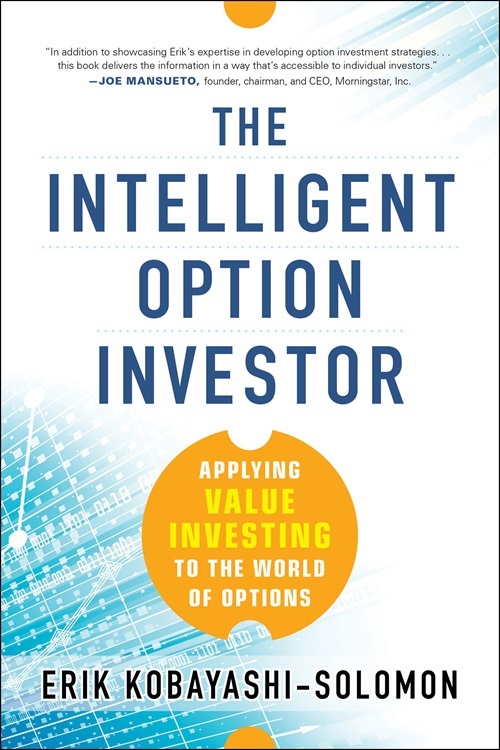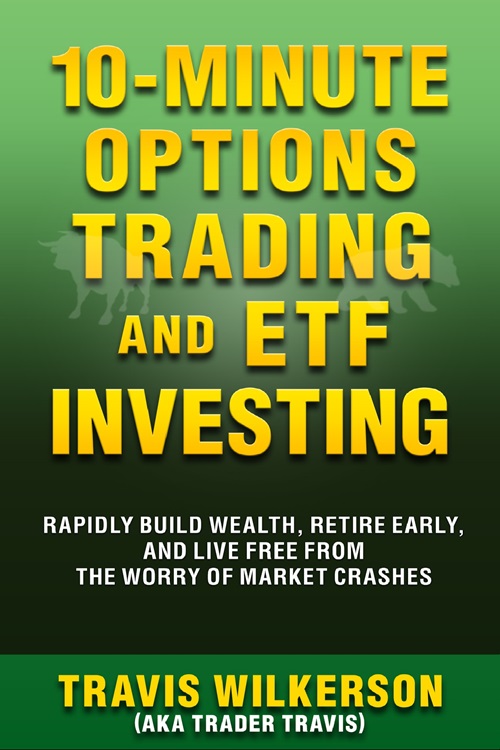THE INTELLIGENT OPTION INVESTOR
ERIK KOBAYASHI-SOLOMON
From Amazon:
HOW TO USE YOUR HUMAN ADVANTAGE TO OUTPERFORM
ALGORITHMS IN THE OPTIONS MARKET
If you're a value investor who wants to get your money
into the lucrative options market, forget about day trading, chart patterns,
and market timing. This systematic book lays out a path to long-term wealth by
taking positions on companies with real intrinsic value--the kind Ben Graham
and Warren Buffett would invest in.
Leave the complex algorithms and "Greeks"
for the floor traders. Erik Kobayashi-Solomon, former investment banker, hedge
fund risk manager, and valuation consultant to the World Bank, gives you the
knowledge and sophistication to understand what options pricing reveals about
the market's estimation of future stock prices. He then demonstrates how to
find tremendous opportunity for low-risk, high-profit investments in the
difference between the market's mechanized price ranges and ones made by you, a
thoughtful human being armed with the insight this book offers.
Everything you need to make options a powerful
contributor to your portfolio is inside, including:
- A thorough explanation of what options are and what
their prices can tell you about the market's expectations for the future price
of a stock
- A proven way to envision the risk/reward trade-off for
stocks and options and a straightforward method to use the flexibility and
directionality of options to tilt the risk/return balance in your favor
- A robust and intuitive framework for assessing the
value of a company
- Strategies to avoid the most common behavioral
pitfalls
- Tips for using the information on an option-pricing
screen
- Thorough coverage of important option investment
strategies, including "covered calls," "protective puts,"
and "collars"
Regardless of your experience level with options, this
versatile guide makes you a better investor. Beginners get a turnkey solution
to growing wealth in options, experienced investors gain savvy guidance for
fine-tuning their practices, and professional investors learn how to
effectively incorporate options into a portfolio.
Understanding valuation in this perceptive light lets
you earn the consistent profits of The Intelligent Option Investor.
The Intelligent Option Investor is the hands-on guide
to using a cutting-edge valuation framework in the fast-paced options market to
boost growth, protect gains, and generate income.
It explains how to use your insightful human mind to
recognize when mechanized options pricing undervalues a stock. Once you see an
opportunity, you'll have all the tools you need to execute a fact-based
decision about how and when to invest in the company.
Have your money make the most for you with the potent
blend of time-honored value investing strategies and hot options vehicles in The
Intelligent Option Investor.
PRAISE FOR THE INTELLIGENT OPTION INVESTOR:
"The Intelligent Option Investor reflects Erik's
keen understanding of how companies create value for their owners, which is
essential to successful option investing. In addition to showcasing Erik's
expertise in developing option investment strategies based on fundamental
security analysis and a long-term time horizon, this book delivers the
information in a way that’s accessible to individual investors, offering them
the resources to use options to help them meet their financial goals." --
JOE MANSUETO, founder, chairman, and CEO, Morningstar, Inc.
"Erik knows--and lays out here--that to use
options successfully, you need to understand the underlying stock and its
valuation first. This is one of few books on options that teaches this
fruitful, combined approach. And that's why it works." -- JEFF FISCHER,
advisor, Motley Fool Options


















